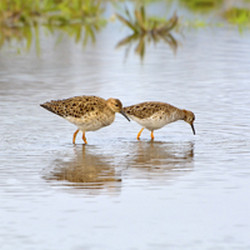Mate availability and sex role reversal
According to some researchers, a major form of natural selection is sexual selection where some individuals out-perform others in terms of finding mates. As Darwin noted when comparing natural with sexual selection, "In summary, while natural selection results from the struggle to survive, sexual selection emerges from the struggle to reproduce." The 'Ecological and life-history bases of sexual selection and sex roles in birds' (SEXUAL SELECTION) project has looked at some of the more controversial effects of the intensity of sexual selection. Researchers studied skewed adult sex ratio (ASR) in shore birds. This revealed that conventional sex roles (e.g.; female caring for offspring) occur in species with female-biased ASR. However, when there are more males than females, there is sex-role reversal. Competition is high for males among mating females and the males care more for the brood. The research team found that there was a higher 'divorce rate' in socially monogamous bird species with a female-biased sex ratio. Furthermore, infidelity in birds – measured as paternity outside the breeding pair – increased when the ratio is skewed towards more males. Unequal resources devoted to egg or sperm production – anisogamy – also came under the parental care microscope. The researchers found that anisogamy had no effect on the share of sexes in the care role. Instead, male contribution to care decreased with increased paternity outside the nest and increased with male-biased ASR. Using theoretical models, researchers demonstrated that sex role specialisation can stabilise parental cooperation. This would promote the evolution of bi-parental care even when there is strong sexual selection. Social environment such as sex ratio has an impact on the role of the sexes in brood care. To date, these effects have not been investigated and SEXUAL SELECTION results are likely to stimulate further research on the topic. More generally this data is important in the theory of parental care division evolution.







